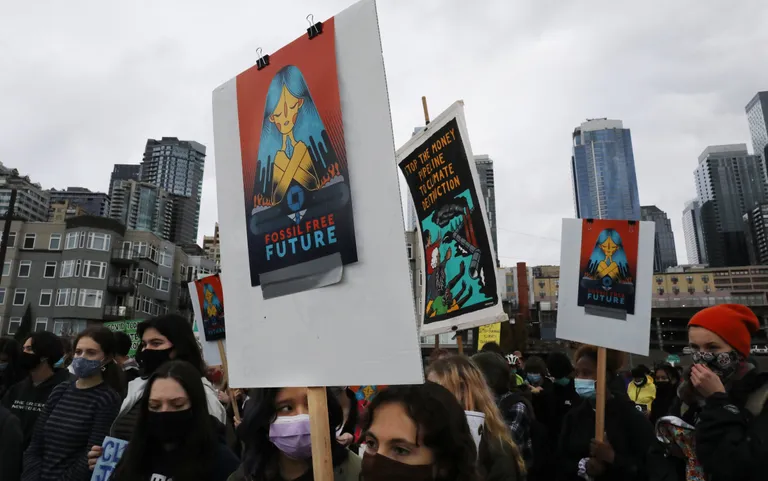Students gather at Pier 62 for a march demanding response to the climate crisis. The global climate emergency, if not addressed, threatens every aspect of our way of life, the author writes. (Alan Berner / Alan Berner, 2021)
Progressive activists in Seattle can help set the national political agenda with their work on a range of issues. Yet too much emphasis on any one area of activism runs the risk of coming at the expense of the country’s — and the globe’s — most urgent priorities.
Looking at local work around diversity issues can be instructive. To apply for public funding from the county lodging tax through 4Culture, organizations may need to undergo a thorough anti-racism self-assessment, provide detailed demographic data and attempt to show that they “uphold inclusive practices through an intersectional racial equity lens.” This work on DEI issues is important and overdue and will help these organizations serve our community better. Unfortunately, we regularly find ourselves facing inequities on a variety of fronts: Voter suppression. Draconian new abortion laws. Multiple ongoing wars with no solutions in sight. Police brutality. The list of battles that are important to fight seems endless.
Of all the outrages that we currently face, however, only one is an existential threat to human civilization as we know it. The global climate emergency, if not addressed, threatens every aspect of our way of life. I am happy to fill out my DEI self-assessment survey, but at the same time I have to wonder: Why aren’t we spending equal amounts of time addressing another very real, very urgent, and yet very solvable problem, one that poses the prospect of rendering all these other questions obsolete? History shows that racial equity issues will take generations to solve, while climate science shows that significant efforts must happen now in order to be effective, making this shift all the more important.
What might this look like in practice? 4Culture could require organizations to report on their efforts to encourage carbon-free transportation to events and classes. They could give credit to organizations presenting art and literature that call attention to global climate issues. They could give further credit to groups offering to donate a percentage of their proceeds to carbon-reduction efforts.
In a normal time, addressing historic racial inequities in funding would be a more important goal for grant providers than addressing environmental issues. But these are not normal times. Progressives are in the streets demanding a cease-fire in the Middle East, bodily autonomy for women, equitable policing and social justice of every stripe. Yet we must not lose sight of the forest for the Earth’s many, dying trees: Without a planet that can sustain life, any victories we might win on these issues are ultimately pointless. I believe that future generations — if, indeed, there are future generations — will judge us for not putting our greatest efforts where they matter most. Thinking of environmentalism as intersectional with other progressive efforts is often useful, but not when doing so justifies taking focus away from our most urgent problems.
So bravo to the Amazon employees who are stepping up to challenge the company on its environmental policies. Thank you for doing what you can to bring about the future we desperately need. The rest of us need to follow your lead and insist on significantly faster efforts to protect the environment in our respective corners of the city as well.
Ultimately it is up to each of us to do what we can do to ensure our civilization survives. Here in progressive Seattle, where we understand the nature of the climate emergency, it is incumbent on us to move the needle toward a greener, more sustainable future. So: 4Culture, and everyone, I challenge you to move carbon policies — carbon reduction, removal, and sequestration — to a place as central to your work as DEI and other progressive issues. Now is very much the time.
